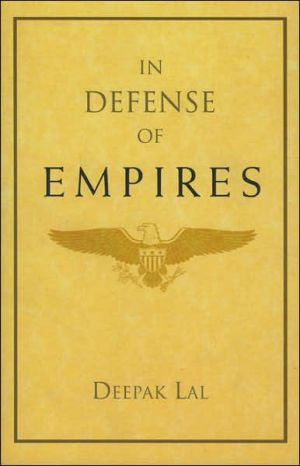

 |

|

The average rating for In Defense of Empires based on 2 reviews is 3.5 stars.
Review # 1 was written on 2020-10-14 00:00:00 Bjarne Dyrlie Bjarne DyrlieA bold and erudite treatment exploring solutions to the current world problems. Prof Lal is clear in his thinking and do not mince words in writing. |
Review # 2 was written on 2017-05-01 00:00:00 Sarah Winters Sarah WintersBlowback was written before 9/11, the event that was to make the word known. It refers to the U.S. actions in the world that bring a response detrimental to the U.S., 9/11 being a the prime example. Americans like to think of the U.S. as a rational actor with good intentions in opposition to crazed people out to do us harm. It's what we are fed by our government and by our news media, but it's mythology. Blowback presents the truth, where foreigners are just as rational as we are and have understandable reasons for their actions. The book is the work of a man who has experience regarding the topics he discusses. He lived in Japan for several years, speaks Japanese and is president of the Japan Policy Research Institute, so when he discusses U.S. policy with regard to Japan and the conditions on Okinawa where the U.S. has a very heavy presence, he tells a story worth hearing. Chalmers Johnson's writing style avoids jargon and acronyms, assuming the reader is simply a curious, likely uninformed American citizen and not a foreign policy expert or history buff. His ability to convey foreign views of American policy is impressive and convincing, undoubtedly because of his personal interaction with foreigners throughout his career. I was particularly impressed by his comparison of American economic terms such as "the free market" to communist terms like "the dictatorship of the proletariat". Terms we accept as explaining how things are sound very different to people outside our country. We have our own ideology and blind spots just as do Marxists. Going into international affairs in different theaters, Johnson gives clear explanations for American policy successes and failures. These accounts are quite different from what we have been told by our politicians and reveal in detail the reasons events have unfolded as they have. Time after time this book illuminated history for me, in particular concerning the Korean War and trade relations between the U.S. and Japan. The North Korean leadership is crazy, right? Read this book. Blowback is a must-read because of the danger of the over-extension of the U.S. military that fields special operations forces in a multitude of countries. These forces act not as defenders of the United States but as trainers, in effect working for U.S. arms manufacturers who sell to all manner of governments. A foreign government deciding to buy U.S. equipment doesn't necessarily make that government a popular one with the people of the country it rules (think the Shah of Iran). This sets up the conditions for blowback. The fullest regional examination in the book is of Okinawa, used as a lever for policy between Japan and the U.S. regardless of the wishes of the local people. Okinawans want to end the stationing of U.S. forces there, but the value of those forces in the Asian plans of the U.S. Department of Defense is such that Japan has been able to get what it wants from the U.S. in trade concessions. Thus it goes the world over with the U.S. planning its moves on the international chessboard, pursuing the impossible task of keeping a lid on unrest anywhere and everywhere so that business can be safely pursued while local people are ignored. The message of the book is if we don't back off from our empire project, we can expect to see consequences we will not like. Our very expensive and extensive efforts are counterproductive. Finishing this book you will not only be well informed, you will be freed of the confusing official history of U.S. relations with other countries that you get from listening to U.S. administrations and TV news. What makes no sense (because it is largely fiction) becomes clear when it is accepted that others have reasons for what they do. Knowing the motivations of others allows the creation of a constructive foreign policy. |
CAN'T FIND WHAT YOU'RE LOOKING FOR? CLICK HERE!!!